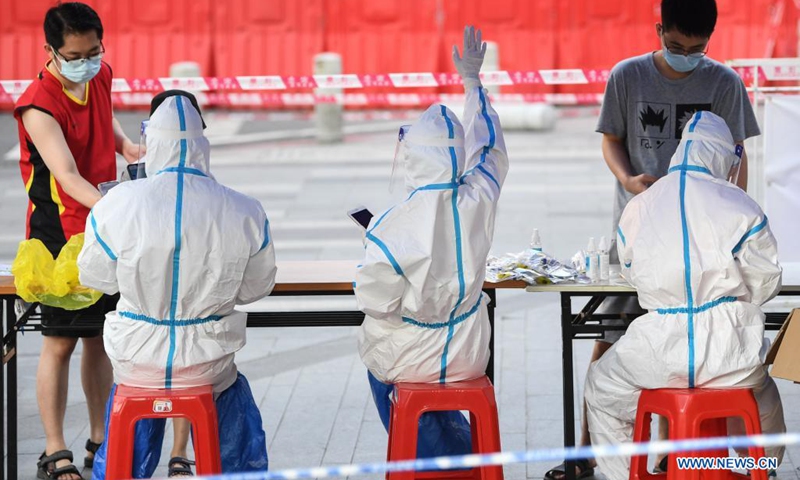Expand examination scope, swift identification of transmission route… Zhong Nanshan talks about China’s success in dealing with Delta variant

People have their information registered before COVID-19 nucleic acid testing in Liwan District of Guangzhou, south China's Guangdong Province, June 8, 2021. A new round of mass testing in high-risk areas of Baihedong Street and Zhongnan Street in Guangzhou started on Tuesday.(Photo: Xinhua)
In discussing the experience of dealing with the more infectious Delta variant of the coronavirus, China's top epidemiologist Zhong Nanshan noted that expanding the scope of the search for "close contacts" and conducting surveillance of animals in closed-off areas, among other measures, are effective in curbing the infection.
The highly contagious Delta variant forced South China's Guangdong Province, the first Chinese province to deal with it, to change its definition of "close contacts" and come up with new strategies to cope with the variant, according to Zhong.
The new definition of close contact was expanded to those who were in the same building as the patient or in the same workplace for the four days before the patient showed the onset of symptoms, Zhong said.
Zhong said that researchers also collected the nucleic acid samples of animals, such as rats, in closed and controlled areas, to exclude the possibility of the virus being transmitted by animals through excreta.
According to the epidemiologist, the new variant is not only more contagious than previous ones, but also has a shorter incubation period and longer time to turn negative in testing.
The incubation period of the Delta variant is one to three days, while the average incubation period of the COVID-19 virus in last year's surge in Wuhan was three to seven days, Zhong said.
He spoke highly of Guangzhou's swift response that helped the province keep the infection at bay for one month, and no other provinces were affected.
People infected with the Delta strain in Guangzhou took 13 to 15 days to test negative, much longer than the common strain of seven to nine days, Zhong pointed out.
The latest surge in Guangzhou started on May 21, when a 75-year-old was found to be infected with the Delta variant. At that time, the new variant was found in 92 countries and regions across the world.
The city reported zero new locally transmitted cases and no new asymptomatic cases from June 19-24. As of Thursday, the province had reported 166 cases during this new wave, all infected with the Delta variant.
If there had not been timely countermeasures by Guangzhou authorities, our model predicts that 7.3 million people could have been infected, Zhong said.
Zhang Zhongde, a specialist in the local medical team, said on Sunday that the Delta variant also caused great difficulty in the treatment of those patients, as it tends to send patients into severe conditions.
Yet with treatment combining the use of traditional Chinese and Western medical methods, 91 out of 166 people had been discharged from hospitals as of Saturday.
Zhong also said that the three most commonly used domestic vaccines still have a protective effect against the Delta strain, based on laboratory results.
"The effect of vaccines preventing the infection of close contacts is 69 percent; and the effect of preventing the virus from developing into pneumonia and the effect of preventing cases of severe illness are 73 percent and 95 percent, respectively," Zhong said.
Due to the threat of the Delta variant, the epidemiologist urged people to get vaccinated, so as to reach herd immunity, which requires at least 80 percent to be vaccinated.
As of June 20, Guangzhou had administered 101 million doses of COVID-19 vaccines, accounting 28.35 percent of the population. The province aims to have more than 40 percent of its inhabitants finish vaccination by the end of June.
Global Times

